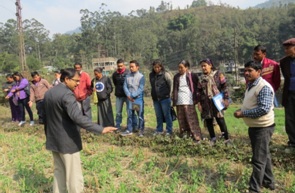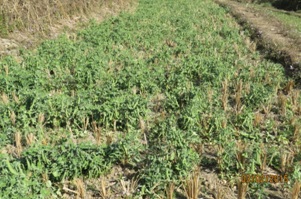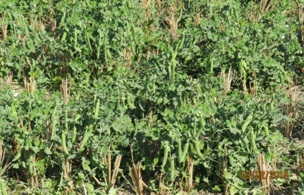Zero till vegetable pea cultivation in low land puddled rice fallow demonstrated to the progressive farmers’ of East Sikkim.
In Sikkim, large areas are kept fallow after rice due to scarcity of rainwater and/or soil moisture during winter season. Generally, most of the farmers in the Sikkim follow mono-cropping system, hence, the cropping intensity of the state is lowly 118 per cent. Instead of growing any second crop after harvest of kharif rice, the farmers of the state leave their rice field fallow during Rabi season. Two major reasons have been identified i) late harvesting of the rice as they are mostly cultivating local cultivars for its taste and aroma and livestock fodder ii) low soil moisture during post rainy season as very scanty rainfall occurs in winter. Therefore, in order to enhance the cropping intensity of the state by exploring the best possible resource conserving technologies (RCTs) like zero tillage by retaining some part of rice stubble (30 per cent) and utilizing the residual soil moisture of kharif rice; ICAR Research Complex for NEH Region, Sikkim Centre under the leadership of Dr. Ravikant Avasthe, introduced zero tillage vegetable pea technology in laying puddled rice fallow has been demonstrated through Krishi Vigyan Kendra (ICAR), East Sikkim, Ranipool to the progressive farmers of the East District of Sikkim. In the technology, vegetable pea crop is sown immediately after harvesting of rice. This is done by opening a narrow slot in soil between two rice rows 30 cm apart and sowing the overnight soaked seed of pea in these rows. The sowing of pea may be done at the earliest after rice harvest and at least 30 per cent stubble of rice may be left on surface of the soil at the time of rice harvest. The same technology has also been demonstrated as front line demonstration to some of the progressive farmers in Timpem village of East Sikkim. A total of 35 numbers of progressive farmers of Sajong, Raymindu and Rumtek villages participated in the demonstration visit.
Dr. Raghavendra Singh, Program Coordinator (I/c) and Senior Scientist (Agronomy) described the necessity of the technology to meet the ever increasing demand food grains of the state. He also emphasized on the relevance of the technology under changing climatic conditions.
Dr. Subhash Babu, Scientist (Agronomy) briefed the farmers about the economic importance of resource conservation techniques (RCTs) used for sowing of vegetable pea under rice fallow.
Dr. Janak Kumar Singh, SMS (Plant Breeding) informed the farmers about the improved varieties of vegetable pea. He also emphasized on the selection of improved varieties of rice over local land races which required less time for maturity. At the end of the programme Shri B. Lepcha, SMS (Horticulture) proposed the vote of thanks.
Vegetable pea variety VRP-6 (Kashi Udai) under zero tillage in low land puddled rice fallow


